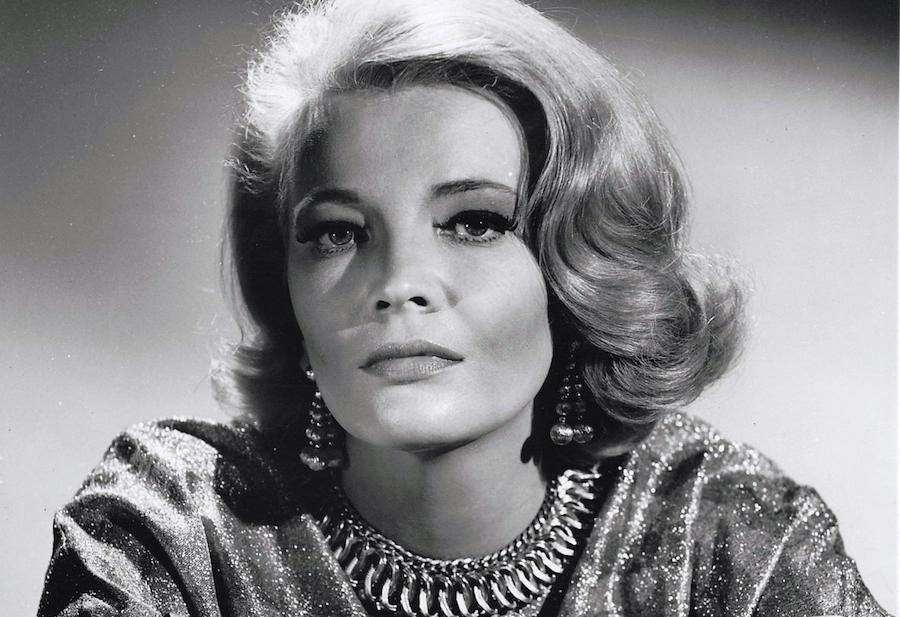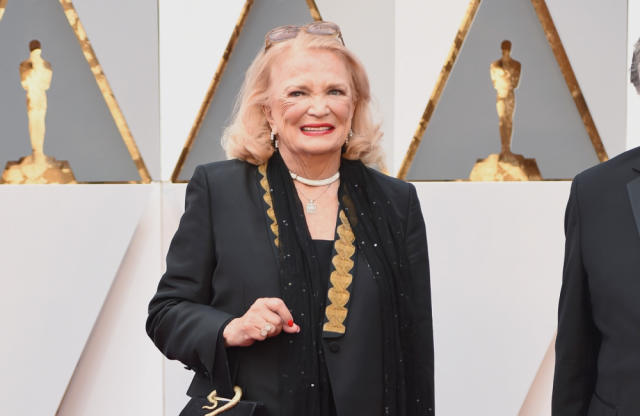Gena Rowlands, one of the last of Hollywood’s living legends, has died at age 94. A representative for her son, director Nick Cassavetes, confirmed Rowlands’ death on Wednesday. No further details were given.

TMZ was first to report the news. According to TMZ, Rowlands died surrounded by family members at her home in Indian Wells, California. She is survived by her actor-director children, Nick, Alexandra and Zoe Cassavetes. For decades, Rowlands was married to the late director and independent film pioneer John Cassavetes.
In June, Nick shared with Entertainment Weekly that his mom is suffering from dementia, much like her character in the 2004 drama “The Notebook.” Rowland played an older version of Rachel McAdams’ character, Allie, in the beloved romance movie, which co-starred Ryan Gosling.
“I got my mom to play older Allie, and we spent a lot of time talking about Alzheimer’s and wanting to be authentic with it, and now, for the last five years, she’s had Alzheimer’s,” Cassavetes told Entertainment Weekly. “She’s in full dementia.”
“It’s so crazy,” he added. “We lived it, she acted it, and now it’s on us.”
Rowlands earned Golden Globe, Emmy awards and an honorary Oscar
Over the course of her half-century career, Rowlands appeared in more than 40 movies and even more television shows. Her most celebrated role was as a manic housewife who is institutionalized in “A Woman Under the Influence” (1974), which was directed by Cassavetes.
The performance won Rowlands a Golden Globe victory and an Oscar nomination as best actress (she lost at the Academy to Ellen Burstyn in “Alice Doesn’t Live Here Anymore”).
She acted in 10 movies for John Cassavetes, who she was with from their marriage in 1954 until his death in 1989.
Rowlands won two Golden Globes, the other for starring in the 1987 TV movie “The Betty Ford Story,” about the former first lady. Her TV work also garnered her a total of four Emmy Awards, for work in a variety of miniseries and movies.

The actress was nominated for an Academy Award twice, the second time for 1980’s “Gloria,” a neo-noir thriller also directed for Cassavetes. In 2015, Rowlands was given an honorary Oscar. During her speech, she thanked her late husband and her chosen profession for giving her a rich life.
“The wonderful thing about being an actress is you don’t just live one life, yours, you live many lives,” she told the crowd.
“For that,” she went on in a speech that resonates today given the recent Hollywood writers and actors strikes, “we have to thank the writers after all they’re the ones who start out with a piece of blank paper and they create the story and the characters, and that gives us actors the opportunity to hopefully bring all those characters to life.”
Rowlands’ career spanned Broadway, film and TV
Rowlands grew up in Cambria, Wisconsin, the daughter of a housewife and actress mother and a politician father. As a child she was a voracious reader.
In a short film she made in 2015 for the Academy called “What Acting Means to Me,” Rowlands said that “acting is very much like reading a book, and as I read I began to realize that as an actor you could be a lot of people and a lot of things, and it caught my fancy.”
Although the family moved due to her father’s political appointments, first to Washington, D.C., and later Minneapolis Rowlands returned to her native state as a young adult and attended the University of Wisconsin.

After graduating, Rowlands headed to Broadway and spent the next decade honing her craft in a range of productions, from “The Seven Year Itch” to “Middle of the Night.” She also found work in the nascent medium of television, acting in everything from Westerns to detective shows.
Rowlands’ Cassavetes film period began in 1963 with “A Child is Waiting” and ended in 1984 with “Love Streams.” The couple often would take more high profile roles in order to pour their earnings in her husband’s independent films.
“It was impossible to raise money outside the studio,” she told The Guardian in a 2001 interview. “We totally financed all the films ourselves except for ‘A Woman Under the Influence,’ for which Peter Falk and his wife paid half.
“After John had done the screenplay for it, everyone said, ‘Why does anyone want to see a picture about a crazy middle-aged dame?'” she said. “But we were luckier than a lot of young directors now because we were both established actors and when we ran out of money, which was all the time, we would stop and each make a movie.”
After the death of Cassavetes, Rowlands continued to act and, occasional, win laurels for her roles. In 2002, she won another Emmy Award for her role in Mira Nair’s “Hysterical Blindness,” and in 2004 appeared in “The Notebook,” which was directed by her son Nick.
In 2007, Rowlands acted in “Broken English” alongside Parker Posey, a movie written and directed by Rowlands’ daughter Zoe.
Over the next few years she appeared in episodes of television shows such as “Monk” and “NCIS,” and in 2015 finally retired from the profession. Since 2012, she has been married to retired businessman Robert Forrest.
Rowlands paid tribute to idol Bette Davis in honorary Oscar speech

Rowlands was especially fond of her idol, actress Bette Davis, who she got to work with in the 1979 movie “Strangers: The Story of a Mother and Daughter,” in which Rowlands, then nearly 50, played Davis’ daughter.
In her honorary Oscar speech, Rowlands recalled an incident during the production when she and Davis both watched snippets of film that had been shot the day before.
When the lights went up, Rowlands was happy with her performance, but Davis seem furious and was poking her finger at the cameraman. It turns out, the Hollywood legend was not happy with how orange her lips looked on film.
Davis suddenly called Rowlands over and asked if she noticed the same thing, and Rowlands deflected by simply saying she had not been playing that close attention to notice.
“And Bette looked at me and said, ‘Huh, you weren’t paying attention? Well, you better start paying attention, because let me tell you something, you’re no spring chicken yourself,'” Rowlands said to laughter.